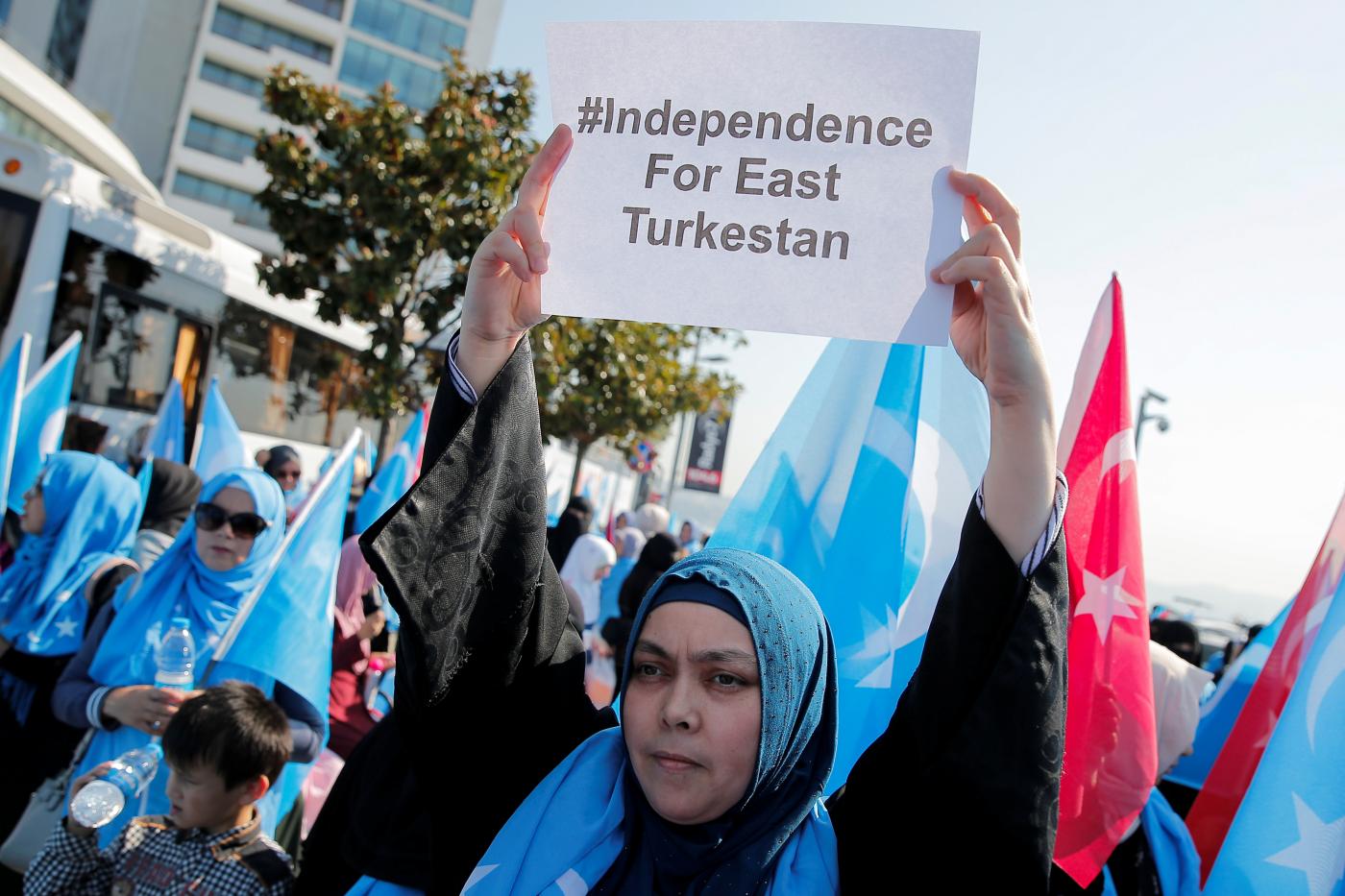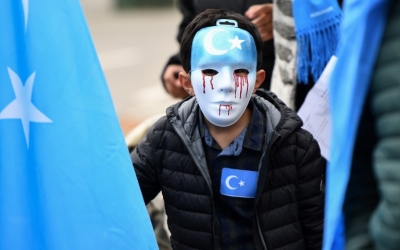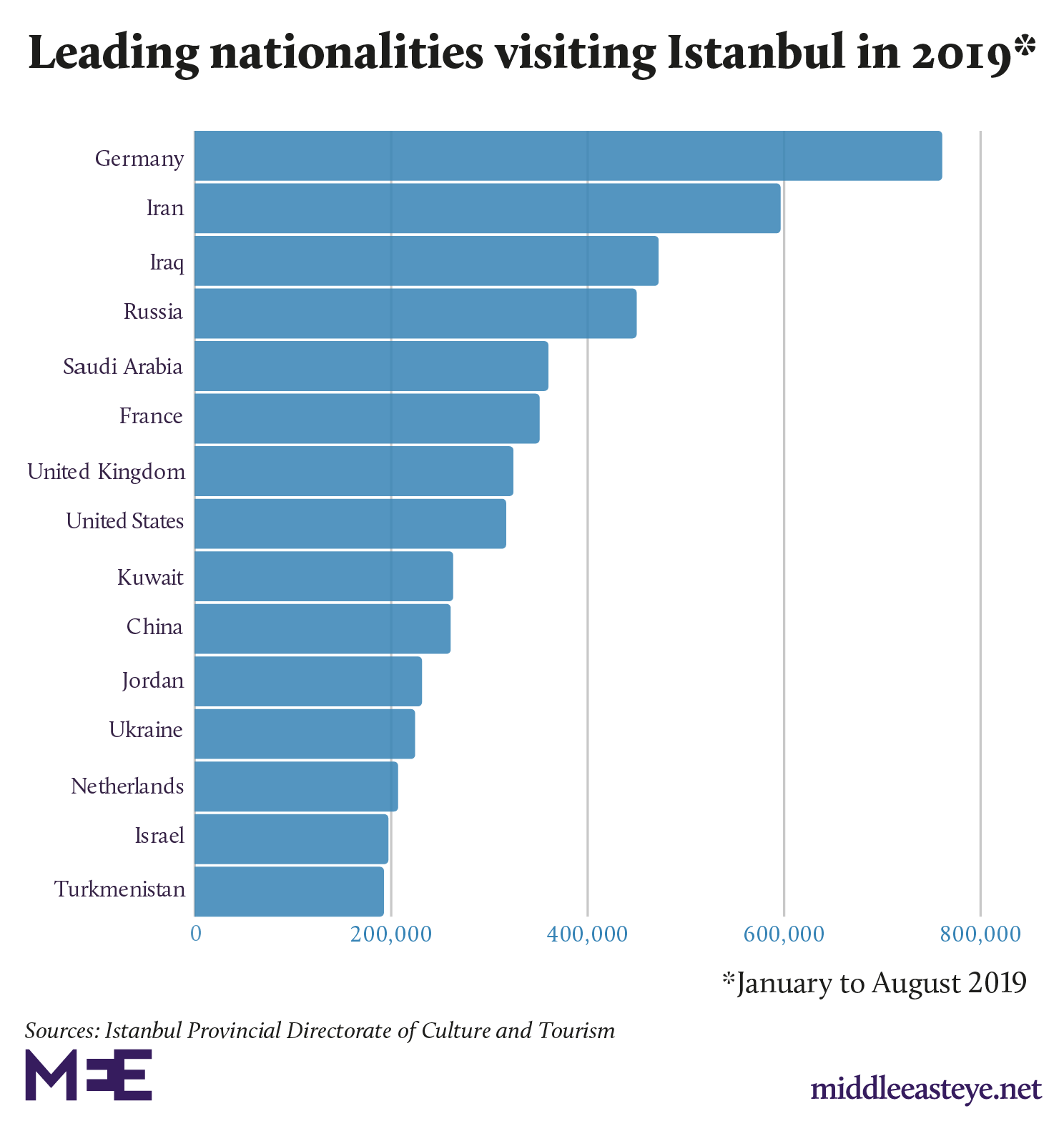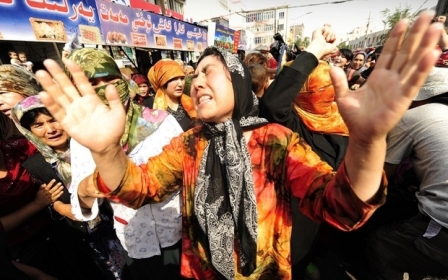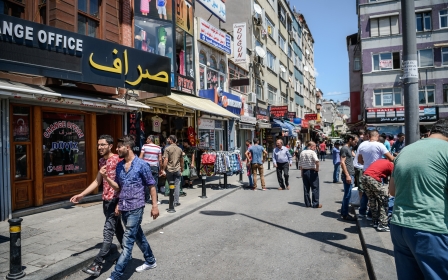Uighurs dismayed at Istanbul mayor's decision to erect Chinese signs across city
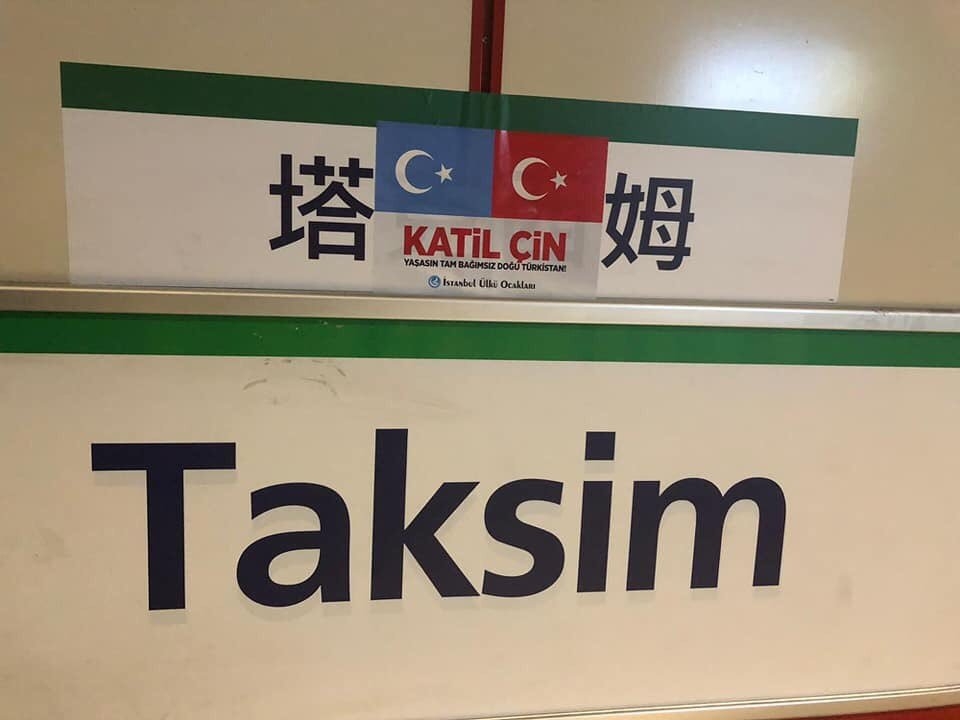
When a friend in Turkey sent Uighur activist Arslan Hidayat a picture showing a sign in Chinese characters at a tram station in Istanbul, he thought it was a joke.
But that joke turned out to be true when pictures emerged of Chinese signs popping up across Istanbul. Earlier this month, the city's newly elected mayor, Ekrem Imamoglu, confirmed plans to install the signs on the occasion of China's national day.
Speaking in Istanbul, Imamoglu proudly declared the signs were an "act of friendship" with Beijing and a "welcome" gift to encourage more tourists from China to visit the city.
Since the announcement, however, photos and videos have been posted online of local residents and Uighurs ripping down the Chinese signs or covering them up with posters denouncing China's treatment of the Uighur minority.
New MEE newsletter: Jerusalem Dispatch
Sign up to get the latest insights and analysis on Israel-Palestine, alongside Turkey Unpacked and other MEE newsletters
Turkish media have also reported that the Istanbul municipality installed the signs at the request of China's embassy in Turkey. Middle East Eye could not confirm these reports.
The move has distressed Abduweli Ayup, as well as other members of the Uighur community in Istanbul - one of the largest outside of China - as Turkey grows closer with Beijing.
"Our problem is not the Chinese people or the letters. If that was the case then we would be opposed to Chinese labels in France, Finland and the US," said Ayup, a Uighur activist formerly based in Turkey and currently living in Norway.
"Our criticism of the Chinese signs in Istanbul is over the timing. Turkey has been a good friend of the Uighurs and spoken out for us, but that seems to be changing slowly."
His concerns were amplified after Turkish President Recep Tayyip Erdogan refrained from highlighting the plight of Uighurs during his UN General Assembly address last month, despite mentioning every other major instance of oppression of Muslims taking place in the world.
Halmuurat Harri, a Uighur living in Finland, believes the frustration over the Chinese signs stems from Erdogan's refusal to acknowledge the plight of Uighurs at the UN.
"The main problem again is not Chinese signs. It's the fact that Erdogan did not mention our struggle," said Harri.
"Why?"
Istanbul has long been a haven for thousands of Uighurs, but some fear this is changing following reports of deportations of members of the minority community back to China - a claim Ankara has denied.
Uighurs, a Muslim-majority Turkic people, have faced mass persecution in China by state authorities. Members of the community have been routinely rounded up for practising their Islamic faith, including praying and observing halal. Some Uighurs have also been detained and arrested for teaching and learning Turkish in China.
This has prompted thousands to flee China in the hope of evading detention in internment camps scattered across China's western province of Xingjiang.
"Turkey is the one place where Uighurs can protest and voice their opinions. Before we could go to Europe, but now that is heavily restricted," Hidayat told MEE from his home in Istanbul.
Perhat Tengritaghli, the founder of a Uighur language school in Istanbul, adds : "This is just another way for the Chinese to oppress us and say that you cannot escape our wrath.
"They have taken our culture, imprisoned us for practicing our faith and hunted us down. Could you imagine them putting up Turkish signs in China? Never."
Accusations of hypocrisy
It remains a mystery why Istanbul's mayor agreed to put up the Chinese signs. Chinese tourists were the tenth-largest source of tourism for Istanbul in 2019, according to figures recorded by the Istanbul Provincial Directorate of Culture and Tourism.
During his mayoral campaign, Imamoglu had used a song by Abdurehim Heyit - a famous Uighur singer - in an election video. Following reports of Heyit's death, an upsurge of criticism prompted China to release a video proving Heyit was still alive inside one of their internment camps.
'Imamoglu used Abdurehim Heyit's song to promote himself and once elected, announced plans to install these Chinese signs'
- Arslan Hidayat, Uighur activist
Uighurs hoped the use of Heyit's song was indicative of Imamoglu's stance on the community living in Istanbul. "It doesn't matter what political party they belong to, they'll change or flip depending on their own interests," said Hidayat.
"Everyone is angry and saying one thing: Hypocrisy. Imamoglu used Abdurehim Heyit's song to promote himself and once elected, announced plans to install these Chinese signs."
The timing of the signs has also drawn some confusion amongst several of Istanbul's minority communities. In July, several Arab restaurants and shops belonging to the city's Syrian refugee community had their Arabic-script signs taken down by Turkish mobs.
Imamoglu himself has been supportive of calls for Syrians to be repatriated back to Syria. When he won his election, the hashtag "Syrians, get out" was trending online.
Uighurs for now remain fearful as signs continue to be put up across Istanbul. "We can only hope they will not be next to be told to get out," Ayup said.
Middle East Eye delivers independent and unrivalled coverage and analysis of the Middle East, North Africa and beyond. To learn more about republishing this content and the associated fees, please fill out this form. More about MEE can be found here.


